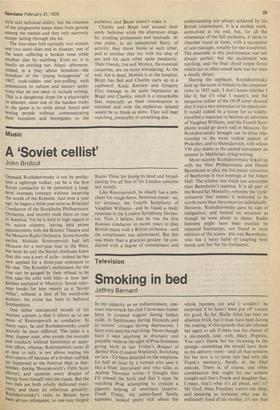Music
A 'Soviet cellist'
John Bridcut Gennadi Rozhdestvensky is not by profession a tightrope walker, yet he is the first Soviet conductor to be permitted a longterm overseas contract without incurring the wrath of the Kremlin. Just over a year ago, he began a three-year term as Principal Conductor of the Stockholm Philharmonic Orchestra, and recently took them on tour in America. Yet he is held in high regard in his native country, having held prime appointments with the Bolshoi Theatre and the Moscow Radio Orchestra. Some months earlier, Mstislav Rostropovich had left Moscow for a twd-year tour in the West, but both he and the Soviet chieftains knew that this was a sort of exile—indeed he has now applied for a three-year extension to his visa. The Kremlin's enthusiasm for the tour can be gauged by their refusal to let him take his cello with him—it now languishes unplayed in Muscovy. Soviet reference books list him merely as a 'Soviet cellist', without a hint of his worldwide acclaim: his crime has been to befriend Solzhenitsyn.
One rather unexpected benefit of his Western sojourn is that it allows us to see More of Rostropovich as conductor. In Many ways, he and Rozhdestvensky could scarcely be more different. The latter is a neat, dapper man, who avoids the rostrum and conducts without histrionics or apparent effort, whereas Rostropovich looks ill at ease in tails, is not above tearing his Shirtsleeve off because of a broken cufflink (as happened at the Festival Hall in September, during Shostakovich's Fifth SymPhony), and squeezes every droplet of energy from himself into the music. But the two men are both wholly dedicated musicians, and share an infectious geniality. kozhdestvensky's visits to Britain have been all too infrequent, so one may forgive Radio Three for losing its head and broadcasting live all five of his London concerts last month.
Like Rostropovich, he clearly has a penchant for rough-hewn, ferocious music—as, for instance, the Fourth Symphony of Vaughan Williams—and he found a ready response in the London Symphony Orchestra. Now I believe that he was the first Russian conductor in recent years to play British music with a British orchestra—and the compliment was appreciated. But this was more than a gracious gesture: he conducted with a degree of commitment and
understanding not always achieved by his British counterparts. It is A restless work, unresolved at the end, but, for all the vehemence of the full orchestra, it turns to chamber music at times, with a succession of solo passages, notably for the woodwind. The ensemble in this performance was not always perfect, but the excitement was catching, and the final chord (triple forte) which can so often sound lame was for once a deadly thrust.
During the applause, Rozhdestvensky held up the score in tribute to the composer (who in 1953 said, 'I don't know whether I like it, but it's what I meant'), and the turquoise colour of the OUP cover showed that it was a new extension to his repertoire. It would indeed be a scoop for so widelytravelled a musician to become an advocate of Vaughan Williams, and the Fourth Symphony would go down well in Moscow, for Rozhdestvensky brought out its close relationship to the more violent aspects of Prokofiev, and to Shostakovich, with whom VW also shares in the second movement an interest in Mahlerian string-writing.
More recently Rozhdestvensky linked up with the New Philharmonia and Daniel Barenboim to play the five piano concertos of Beethoven in two evenings at the Albert Hall. The scheme was much less admirable than Barenboim's stamina. It is all part of the Boxed Set Mentality, whereby the 'cycle' (whatever that means) is reckoned to be worth more than the concertos individually. Howevei, Rozhdestvensky gave no sign of indigestion, and looked on occasion as though he were about to dance. Radio listeners might have been puzzled by repeated footstamps, not found in most editions of the scores: this was Barenboim, who has a nasty habit of coupling both hands and feet for his fortissimo.


































 Previous page
Previous page